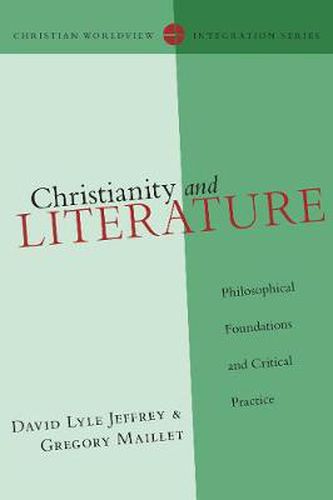Readings Newsletter
Become a Readings Member to make your shopping experience even easier.
Sign in or sign up for free!
You’re not far away from qualifying for FREE standard shipping within Australia
You’ve qualified for FREE standard shipping within Australia
The cart is loading…






This title is printed to order. This book may have been self-published. If so, we cannot guarantee the quality of the content. In the main most books will have gone through the editing process however some may not. We therefore suggest that you be aware of this before ordering this book. If in doubt check either the author or publisher’s details as we are unable to accept any returns unless they are faulty. Please contact us if you have any questions.
What has Jesus Christ to do with English literature? ask David Lyle Jeffrey and Gregory Maillet in this insightful survey. First and foremost, they reply, many of the world’s best authors of literature in English were formed–for better or worse–by the Christian tradition. Then too, many of the most recognized aesthetic literary forms derive from biblical exemplars. And finally, many great works of literature demand of readers evaluative judgments of the good, the true and the beautiful that can only rightly be understood within a Christian worldview. In this book Jeffrey and Maillet offer a feast of theoretical and practical discernment. After an examination of literature and truth, theological aesthetics, and the literary character of the Bible, they turn to a brief survey of literature from medieval times to the present, highlighting distinctively Christian themes and judgments. In a concluding chapter they suggest a path for budding literary critics through the current state of literary studies. Here is a must-read for all who are interested in a Christian perspective on literary studies. The Christian Worldview Integration Series, edited by J. P. Moreland and Francis J. Beckwith, seeks to promote a robust personal and conceptual integration of Christian faith and learning, with textbooks focused on disciplines such as education, psychology, literature, politics, science, communications, biology, philosophy, and history.
$9.00 standard shipping within Australia
FREE standard shipping within Australia for orders over $100.00
Express & International shipping calculated at checkout
This title is printed to order. This book may have been self-published. If so, we cannot guarantee the quality of the content. In the main most books will have gone through the editing process however some may not. We therefore suggest that you be aware of this before ordering this book. If in doubt check either the author or publisher’s details as we are unable to accept any returns unless they are faulty. Please contact us if you have any questions.
What has Jesus Christ to do with English literature? ask David Lyle Jeffrey and Gregory Maillet in this insightful survey. First and foremost, they reply, many of the world’s best authors of literature in English were formed–for better or worse–by the Christian tradition. Then too, many of the most recognized aesthetic literary forms derive from biblical exemplars. And finally, many great works of literature demand of readers evaluative judgments of the good, the true and the beautiful that can only rightly be understood within a Christian worldview. In this book Jeffrey and Maillet offer a feast of theoretical and practical discernment. After an examination of literature and truth, theological aesthetics, and the literary character of the Bible, they turn to a brief survey of literature from medieval times to the present, highlighting distinctively Christian themes and judgments. In a concluding chapter they suggest a path for budding literary critics through the current state of literary studies. Here is a must-read for all who are interested in a Christian perspective on literary studies. The Christian Worldview Integration Series, edited by J. P. Moreland and Francis J. Beckwith, seeks to promote a robust personal and conceptual integration of Christian faith and learning, with textbooks focused on disciplines such as education, psychology, literature, politics, science, communications, biology, philosophy, and history.